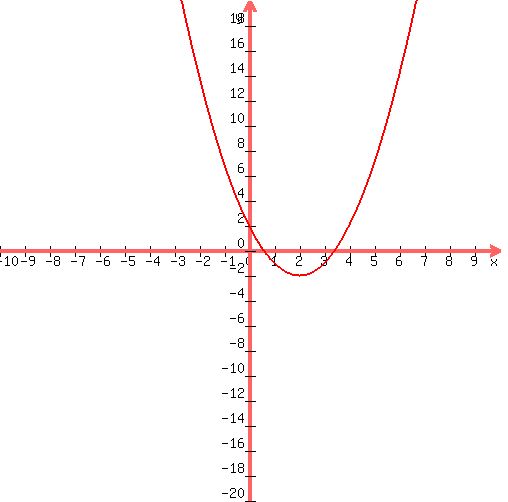Question 43566: Use completing the square or the quadradic formula to find the solutions to the equation: x^2-4x+2=0. Thank you for your time.
Answer by aaaaaaaa(138)   (Show Source): (Show Source):
You can put this solution on YOUR website!
| Solved by pluggable solver: SOLVE quadratic equation with variable |
Quadratic equation  (in our case (in our case  ) has the following solutons: ) has the following solutons:

For these solutions to exist, the discriminant  should not be a negative number. should not be a negative number.
First, we need to compute the discriminant  : :  . .
Discriminant d=8 is greater than zero. That means that there are two solutions:  . .


Quadratic expression  can be factored: can be factored:

Again, the answer is: 3.41421356237309, 0.585786437626905.
Here's your graph:
 |
Now for the other method:
| Solved by pluggable solver: COMPLETING THE SQUARE solver for quadratics |
Read this lesson on completing the square by prince_abubu, if you do not know how to complete the square.
Let's convert  to standard form by dividing both sides by 1: to standard form by dividing both sides by 1:
We have:  .
What we want to do now is to change this equation to a complete square .
What we want to do now is to change this equation to a complete square  . How can we find out values of somenumber and othernumber that would make it work? . How can we find out values of somenumber and othernumber that would make it work?
Look at  : :  . Since the coefficient in our equation . Since the coefficient in our equation  that goes in front of x is -4, we know that -4=2*somenumber, or that goes in front of x is -4, we know that -4=2*somenumber, or  . So, we know that our equation can be rewritten as . So, we know that our equation can be rewritten as  , and we do not yet know the other number. , and we do not yet know the other number.
We are almost there. Finding the other number is simply a matter of not making too many mistakes. We need to find 'other number' such that  is equivalent to our original equation is equivalent to our original equation  . .

The highlighted red part must be equal to 2 (highlighted green part).
 , or , or  . .
So, the equation converts to  , or , or  . .
Our equation converted to a square  , equated to a number (2). , equated to a number (2).
Since the right part 2 is greater than zero, there are two solutions:

, or




Answer: x=3.41421356237309, 0.585786437626905.
|
Note that it says that 
|
|
|